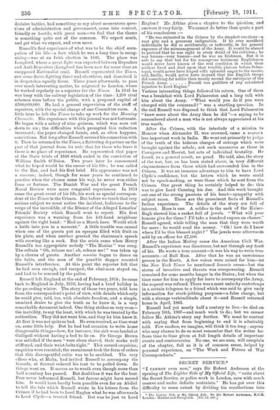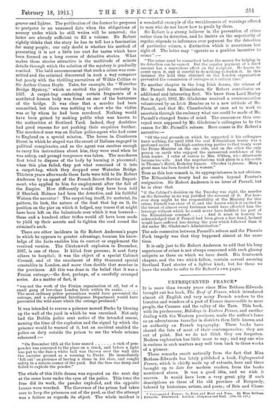SECRET SERVICE.*
"I CANNOT even now," says Sir Robert Anderson at the opening of The Lighter Side of My Official Life, "write about the Secret Service, or police work in London, save with much reserve and under definite restraints." He has got over this difficulty to some extent by dividing his recollections into • The Lighter Side of My Official Life. By Sir Robert Anderson, K.C.B. London : Hodder and Stoughton. 110.. Cd. net.]
graver and lighter. The publication of the former he proposes to postpone to an unnamed date when the obligations of
secrecy under which be still -writes will be removed; the latter are already sufficient to fill a volume. Sir Robert
rightly thinks that the story he has to tell has a fascination for many people ; our only doubt is whether his method of presenting it is not a little too curt for tastes which have been formed on a long course of detective stories. What makes these stories attractive is the multitude of minute details through which the solution of the mystery is gradually reached. The bald announcement that such a crime was com- mitted and the criminal discovered in inch a way compares but poorly with the thrilling narratives of Wilkie Collins or Sir Arthur Conan Doyle. Take, for example, the " Waterloo Bridge Mystery," which so excited the public curiosity in 1857. A carpet-bag containing certain fragments of a mutilated human body was found on one of the buttresses of the bridge. It was clear that a murder had been
committed, but there was nothing to show who the victim was or by whom he had been murdered. Nothing would have been gained by making public what was known to the authorities at Scotland Yard. Indeed, they doubtless
had good reasons for not pushing their enquiries further. The murdered man was an Italian police-agent who had come to England on a special mission. The house in Cranbourn Street in which he stayed was the resort of Italians engaged in political conspiracies, and as the agent was careless enough to carry his instructions about him, they were read when he was asleep, and prompt vengeance was taken. The murderers first tried to dispose of the body by burning it piecemeal;
when this plan failed, they put what remained of it into a carpet-bag, which they dropped over Waterloo Bridge.
Thirteen years afterwards these facts were told to Sir Robert Anderson by an agent of the French Secret Service Depart- ment, who applied to him for employment after the fall of the Empire. How differently would they have been told if Sherlock Holmes had been the detective, and his faithful Watson the narrator ! The carpet-bag itself, its material, its pattern, its look, the nature of the dust that lay on it, its position on the pier on which it lodged, any traces tl:at might have been left on the balustrade over which it was lowered— these and a hundred other trifles would all have been made to yield up their secrets and to tighten the cord round the criminal's neck.
There are other incidents in Sir Robert Anderson's pages in which he appears to greater advantage, because his know- ledge of the facts enables him to correct or supplement the received version. The Clerkenwell explosion in December, 1867, is one of these. It killed four persons; it sent forty others to hospital ; it was the object of a special Cabinet Council, and of the enrolment of fifty thousand special constables in London, and more than double that number in
the provinces. All this was done in the belief that it was a Fenian outrage,—the first, perhaps, of a carefully arranged series. As a matter of fact, it
"was not the work of the Fenian organisation at all, but of a small gang of low-class London Irish within its ranks The most ordinary police precautions would have prevented the outrage, and a competent Intelligence Department would have prevented the wild scare which the outrage produced."
It was intended to rescue a prisoner named Burke by blowing up the wall of the yard in which he was exercised. Not only had the Dublin police sent notice of the intended rescue, naming the time of the explosion and the signal by which the
prisoner would be warned of it, but an accident enabled the police on duty outside the prison to see the whole scheme rehearsed :— " On December 12th at the hour named a cask of gun-
. powder was conveyed to the place on a truck, and before a light was put to the fuse a white ball was thrown over the wall into the exercise ground as a warning to Burke. lie immediately 'fell out' on pretence of having a stone in his shoe, and sought safety in a remote corner of the yard. But the fuse was damp and failed to explode the powder."
The whole of this little drama was repeated on the next day at the same hour under the eyes of the police. This time the fuse did its work, the powder exploded, and the opposite houses were wrecked. The Governor of the prison had taken care to keep the prisoners out of the yard, so that the attempt was a failure as regards its object. The whole incident is
• . •
a wonderful example of the Worthlessnesi of warnings offered
to men who do not know how to profit by the.m.
• . Sir Robert is a strong believer in the prevention of crime rather than its detection, and he insists on the superiority of regular stipends to informers over payment for the detection of particular crimes, a distinction which is sometimes lost sight of. The latter may " operate as a positive incentive to crime" :—
" The crime must be committed before the money for helping in its detection can be earned. But the regular payment of a fixed amount has a marvellous effect on the recipient. He learns to count upon it, and is careful to do nothing to forfeit it. In this instance the hold thus obtained on the London organisation prevented the commission of outrages at a critical time."
To another chapter in the long Irish drama, the release of Mr. Parnell from Kilmainham, Sir Robert contributes an additional and interesting fact. We know from Lord Morley that in April, 1882, Mr. Gladstone 'received a communication volunteered by an Irish Member as to a new attitude of Mr.
Parnell, and that Mr. Chamberlain at once set to work to ascertain through the emissary what use could be made of Mr.
Parnell's changed frame of mind. The assurances thus con- veyed were supposed by Mr. Gladstone's colleagues to be the reason for Mr. Parnell's release. Here comes in Sir Robert's narrative:—
" Of the real arounds on which he supported it his colleagues knew nothing, for until 1883 the real Kilmainham treaty was a profound secret. The high contracting parties to that treaty were the Prime Minister on the one side, and on the other the only person on earth who enjoyed the unreserved confidence of the Irish leader. I refer of course to Mrs. O'Shea, vili3 afterwards became his wife. And the negotiations took place in a tete-a-tete in Thomas's Hotel, Berkeley Square. Cherchez 7...1 femme. Many a great man has been fooled by a woman."
True as this last remark is, its appropriateness is not obvious. The Kilmainham treaty had no results beyond Forster's resignation. Sir Robert Anderson is no lover of Parnell, but he is clear that
"if the Cabinet's decision on the Tuesday was right, the murder on the Saturday in no way justified the reversal of it. For how- ever deep might be the responsibility of the Ministry for this crime, Parnell was clear of it, and the horror which it excited in the breast of almost every Irishman would have afforded him the leverage without which he could never have fulfilled his part of the Kilmainham compact. . . . . . And it must in honesty be acknowledged that if Parnell had been given a free hand, Ireland would have suffered less during the year which followed than it did under Mr. Gladstone's Administration."
The sole connexion between Parnell's release and the Phoenix Park tragedy was that they happened almost at the same time.
It is only just to Sir Robert Anderson to add that his long experience of crime is not always concerned with such gloomy subjects as those on which we have dwelt. His fourteenth chapter, and the two which follow, contain several amusing Scotland Yard stories of a lighter kind; but for these we leave the reader to refer to Sir Robert's own pages.







































 Previous page
Previous page